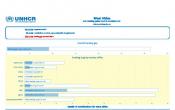Niger
Operation: Niger
Location
{"longitude":8,"latitude":18,"zoom_level":0}
Latest update of camps and office locations 21 Nov 2016. By clicking on the icons on the map, additional information is displayed.
Key Figures
| 2018 planning figures | |
| 100% | of Nigerian refugees and IDPs will be registered on an individual basis |
| 100% | of Malian refugees will be socially and economically integrated |
| 100% | of refugees and asylum-seekers identified in need of resettlement will be submitted for resettlement |
| 80% | of Nigerian households will live in adequate housing |
| 2016 end-year results | |
| 23,000 | displaced families in the Diffa region received gas for energy |
| 20,000 | people have access to water through a solar energy center in Tahoua |
| 9,500 | households in Diffa received emergency shelters |
| 2,000 | households in Diffa received land parcels |
| 400 | Malian refugee families in Tillabery received houses |
Latest Updates and Related Links
January - December 2017
People of Concern
9%
Decrease in
2016
2016
| 2016 | 302,227 |
| 2015 | 332,164 |
| 2014 | 147,936 |

[["Refugees",166093],["Asylum-seekers",65],["IDPs",121391],["Others of concern",14678]]
Loading ...
Niger
< Back
2016
{"categories":[2013,2014,2015,2016,2017,2018],"budget":[56.45169034,44.15721094,49.767155435,51.18816609,82.54923247,65.810299125],"expenditure":[30.65597188,26.55522036,27.8804749,25.34641563,null,null]}
{"categories":[2013,2014,2015,2016,2017,2018],"p1":[56.45169034,44.15721094,46.858700085,46.54393827,73.06699146,53.76585833],"p2":[null,null,0.25436852,0.94422782,0.685411,0.733498],"p3":[null,null,null,null,null,null],"p4":[null,null,2.65408683,3.7,8.79683001,11.310942795]}
{"categories":[2013,2014,2015,2016,2017,2018],"p1":[30.65597188,26.55522036,25.69854914,20.99749897,null,null],"p2":[null,null,0.25079906,0.72452801,null,null],"p3":[null,null,null,null,null,null],"p4":[null,null,1.9311267,3.62438865,null,null]}
Loading ...
CHOOSE A YEAR
- 2014
- 2015
- 2016
- 2017
- 2018
Year-end Overview
Working environment
Although Niger is a stable country, it is surrounded by conflict-affected countries. The operational environment is challenged by the increased insecurity near the border region with Mali and in the Diffa region. Furthermore, the mixed movements that transit through Agadez have required UNHCR to identify asylum-seekers among the migrants. Chronic food insecurity, drought, floods and other challenges further weaken the already fragile country.
UNHCR is working with the Government to look for alternatives to camps and improve the socio-economic integration of refugees. To the extent possible, basic services are provided through national systems. UNHCR is developing a comprehensive urbanization program to secure access to land for housing, including securing the right to land titles in the Diffa and Tillabery regions and in host communities.
Two central elements of UNHCR's coordination mechanisms and partnership framework in Niger are: strengthening multi-stakeholder partnerships to assist the host country in providing assistance and protection to IDPs, and strengthening refugee self-reliance. Emphasis is placed on working with authorities at the national and local levels to facilitate the progressive socio-economic inclusion of refugees and IDPs, and utilizing the productive capacities of refugees and IDPs by helping them to access education, housing, land, livelihoods, and services.
UNHCR has developed a multi‐year and multi partner strategy which reflects the operation’s vision for the next three years. This strategy is linked to key national development plans and will build on on-going discussions with key strategic partners.
Key priorities
In 2018, UNHCR will focus on:
Mali Situation
- Strengthening the targeted assistance (particularly livelihoods) to refugees in accordance with their levels of vulnerability and capacity;
- Continuing socio-economic integration through the integration of basic services (water, health, education) and out-of-camp (urbanization) into national systems;
- Maintaining emergency response capacity.
Nigeria Situation
- Maintaining efforts under protection, protection mainstreaming, and the recording or documenting of forcibly displaced people;
- Support authorities in finding solutions and rehabilitation/development;
- Strengthening cross-border coordination with other UNHCR operations who are working in the Nigeria Situation;
- Improving the normative framework for IDP management.
Mixed Movements
- Supporting the Nigerien authorities in strengthening the normative framework and improving the fluidity of the refugee status determination process and, more globally, the assistance and protection of people in need of international protection in the framework of t mixed movement;
- Strengthening outreach and communication channels to the people of concern to UNHCR;
- Strengthening the partnership framework with IOM;
- Advocating international protection and solutions to be taken into account in mixed movement, including resettlement and the provision of legal alternatives to irregular migration.





